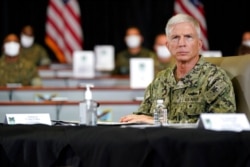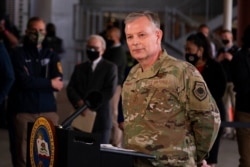Just as top U.S. defense and diplomatic officials are meeting with allies in Asia to find ways to counter the threat from a rising, more aggressive China, a key military commander is warning the front line in the competition for global dominance between Washington and Beijing is much closer to home.
The commander of U.S. forces in Central and South America, Southern Command's Admiral Craig Faller, told lawmakers Tuesday that China has become the leading threat in the region, taking advantage of the coronavirus pandemic and increased lawlessness to impose its will on a growing number of countries.
"I look at this hemisphere as the front line of competition," Faller told members of the Senate Armed Services Committee, further describing Beijing's efforts as a "full-court press."
"I feel a sense of urgency," he added. "Our influence is eroding."
Faller's comments are just the latest in a series of increasingly stern warnings from key U.S. military officials in recent weeks, cautioning U.S. policymakers about China's ambitions and the lengths to which they believe Beijing will go to make them a reality.
Just last week, the commander of U.S. Indo-Pacific Command told the same committee that Washington's inability to sufficiently push back against Chinese military activity was encouraging China to become ever more aggressive.
Earlier this month, Indo-Pacific Command's top intelligence officer told a virtual conference that the United States was already getting "a taste" of what is likely to come.
"You're going to find a very global, expeditionary Chinese military that will be there to step in anywhere they think China's interests are jeopardized," said Navy Rear Admiral Michael Studeman.
The administration of U.S. President Joe Biden appears to be taking such warnings seriously.
Defense Secretary Lloyd Austin and Secretary of State Antony Blinken are using their first overseas trips to consult with key allies, including Japan and South Korea, in part to address concerns about the growing danger posed by China and to discuss ways to hold Beijing accountable for actions that violate existing international norms.
But on Tuesday, Faller warned that threat, which he described repeatedly as "insidious," is much closer.
"Some examples include their pursuit of multiple port deals, loans for political leverage, vaccine diplomacy that undermines sovereignty, state surveillance, IT, and the exploitation of resources such as illegal unregulated and unreported fishing," he told reporters at the Pentagon, following his testimony on Capitol Hill.
Faller said China's coronavirus vaccine diplomacy is especially worrisome.
"They are using the vaccines to leverage deals for their IT, their 5G," he told lawmakers during Tuesday's hearing. "And they're using it to try to drive a wedge between some nations like Taiwan and others in the region."
The SOUTHCOM commander confirmed reports, like those in The New York Times, that China has been refusing to share the vaccine with Central and South American countries that continue to maintain relationships with Taiwan unless those countries move to cut or reduce ties.
The concerns do not end there.
U.S. Northern Command Commander General Glen VanHerck, responsible for U.S. troops and security in parts of the Caribbean, the Bahamas and Mexico, told lawmakers Tuesday that China's influence continues to creep northward.
"They are absolutely in the NOTHCOM AOR [area of responsibility] attempting to influence in the Bahamas, working through 5G for example," VanHerck said. "The same thing in Mexico."
U.S. military officials likewise expressed concern about the growing relationship between Chinese operations in Central and South America and transnational crime, described by SOUTHCOM's Faller as the second biggest threat to the U.S. in the Americas.
"They market in drugs, and people and guns and illegal mining," Faller said of the various crime organizations that have secured a foothold across the region. "And one of the prime sources that underwrites their efforts is Chinese money laundering."
To counter China, Faller urged lawmakers to help ensure a continued U.S. presence and partnership.
"It's important that we remain engaged in this hemisphere," he said. "It's our neighborhood, That proximity matters."
"What I hear from my partners is … 'We want to partner with you, but when you're drowning, you need a life ring — you're going to take the life ring from whoever throws it," Faller said.









